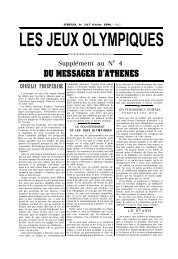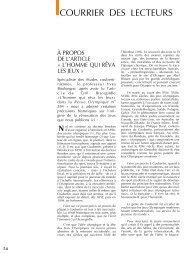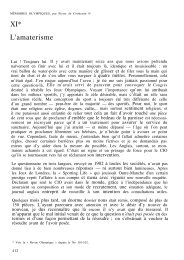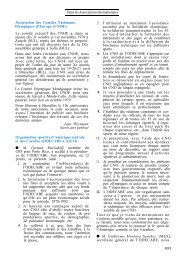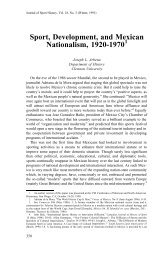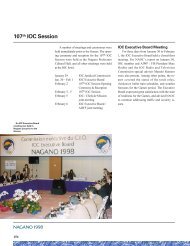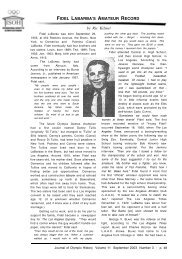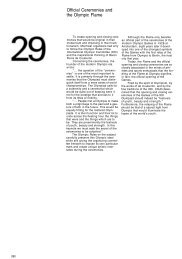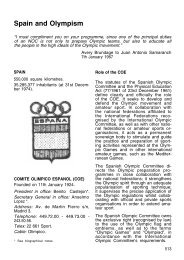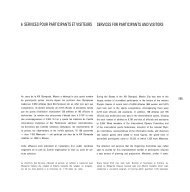Part 2 - LA84 Foundation
Part 2 - LA84 Foundation
Part 2 - LA84 Foundation
Create successful ePaper yourself
Turn your PDF publications into a flip-book with our unique Google optimized e-Paper software.
580<br />
20. Press Village<br />
20.5<br />
Lodging Operation<br />
20.5.1<br />
—————————————–<br />
Basics for Operation<br />
The Press Village's 1,848 apartment<br />
units in 36 buildings were divided into<br />
four zones and 38 lodging districts,<br />
and were managed separately.<br />
A chief was placed in each of the 38<br />
lodging districts' management offices<br />
on July 14, 1988.<br />
The chiefs handled matters relating to<br />
the takeover, placement, retrieval and<br />
returning of the materials. They were<br />
also responsible for keeping order in<br />
the lodging facilities, room service,<br />
front desk service and laundry.<br />
The operation personnel at the lodging<br />
facilities numbered 1,496 in all. The<br />
figure broke down to one director of<br />
housing operation, six managers, 13<br />
operation officers, 38 district chiefs, 38<br />
front desk chiefs, 115 materials and<br />
administration personnel, 502 lodging<br />
maintenance personnel, 246 room<br />
service personnel, 198 front desk<br />
personnel, 198 guides and 152<br />
interpreters.<br />
Among the operation personnel, the<br />
maintenance personnel received<br />
audio-visual education for 30 hours in<br />
July. Audio-visual education was also<br />
offered to the interpreters, guides and<br />
front service personnel for a few days<br />
in July and August at the Korea<br />
National Tourism Corp. Education<br />
Center. Education for district chiefs<br />
were conducted for 43 hours during a<br />
week in July, focusing on the on-site<br />
exercise at hotels.<br />
The SLOOC took over the facilities<br />
from the Seoul city administration on<br />
July 1, 1988. After opening the lodging<br />
management office, the SLOOC put<br />
materials in place and furnished the<br />
buildings by the end of August.<br />
A total of 1,800 units in 35 buildings<br />
out of the total 36 buildings were used<br />
for lodging. There were a total of 5,622<br />
rooms comprising 1,199 Single-A type<br />
rooms, 3,403 Single-B rooms, 782<br />
Single-C rooms and 227 Twin rooms.<br />
Each room had a telephone, a 14-inch<br />
or 16-inch color TV set, a small-sized<br />
refrigerator, bed, wardrobe for oneperson<br />
use, a desk and chair, an electric<br />
lampstand, a wall clock, a<br />
thermos, glasses and a comb. Thirteen<br />
kinds of toiletries and other<br />
conveniences were also supplied<br />
along with bags and stationery.<br />
20.5.2<br />
Lodging Allocation<br />
—————————————–<br />
For the allocation of the rooms, the<br />
journalists were classified by nation<br />
and by news media. Those working for<br />
print media were divided according to<br />
the specialized areas, continents,<br />
languages and agencies. Those at<br />
broadcasting media were grouped by<br />
associations or major networks.<br />
No special consideration was given to<br />
women journalists in the course of<br />
room allocation and each news media<br />
allotted some of their rooms to women<br />
on their own judgment.<br />
From July 1988, rooms were designated<br />
for those who had filed advance<br />
deposits and the allocation was<br />
finished before the village was formally<br />
opened.<br />
It was the right of the SLOOC to allocate<br />
the rooms to journalists. The<br />
SLOOC tried to accommodate the<br />
journalists' special requests concerning<br />
the room allocation. The rooms<br />
were allocated on a first-come, firstserved<br />
basis.<br />
When a journalist asked for the<br />
change of his or her room before paying<br />
the accommodation fee and completing<br />
the necessary procedures, his<br />
or her request was fully considered<br />
and the accommodation documents<br />
were reissued. A total of 288 such<br />
requests were filed.<br />
Requests for change of rooms were<br />
not accepted after the accommodation<br />
procedures were completed, except in<br />
some extraordinary cases.<br />
20.5.3<br />
Lodging Management<br />
—————————————–<br />
The maintenance of the lodging facilities<br />
was of crucial importance. A<br />
devoted workforce was needed to<br />
carry out the work throughout the<br />
Games period; 521 members of the<br />
Seoul YWCA were thus mobilized on a<br />
short-term employment basis.<br />
They cleaned the bedrooms, living<br />
rooms and bathrooms, made beds,<br />
changed linen and other lodging<br />
materials, supplied needed items, and<br />
conducted household safety checks.<br />
They began their work on August 24,<br />
one week before the official opening of<br />
the village and continued to work until<br />
October 5. The official working hours<br />
were from 9 a.m. to 6 p.m.<br />
A dozen YWCA members were<br />
assigned to clean up 48 units in each<br />
district. Each three-person team<br />
managed a dozen apartments.<br />
Some 264 military support personnel<br />
were posted for various services at<br />
lodging facilities. It was earlier questioned<br />
if the military personnel would<br />
be proper for such services, but their<br />
attitudes won high praise.<br />
They guided the journalists into their<br />
rooms and carried the baggages at<br />
the time of check-in and check-out.<br />
They also supplied potable water. They<br />
worked on two shifts around the clock<br />
from September 1 to October 5.<br />
Front desks were set up at each district<br />
management office. Thirty-eight<br />
front desk chiefs supervised 198 front<br />
desk personnel.<br />
The front desk on the first floor of the<br />
lodging district controlled entries and<br />
exits and the operation of the elevators.<br />
The military support personnel<br />
were assigned to the front desks to<br />
collect the room number cards, and<br />
handle keys, postal services and messages.<br />
The entrances were decorated<br />
with a board to collect the signatures<br />
of the journalists staying at the village.<br />
Notices were put up on the bulletin<br />
board at the entrance and public relations<br />
materials were distributed. The<br />
front desk personnel worked around<br />
the clock on two shifts from September<br />
1 to October 5.<br />
Furniture and electronic appliances<br />
were placed in each room by the suppliers,<br />
and toiletries and other conveniences<br />
for 20 days' use were distributed<br />
by the district lodging<br />
management offices.<br />
Bed sheets were changed daily as<br />
were the bath towels and hand towels.<br />
Each journalist was supplied with<br />
three cans of Coke, Diet Coke, and<br />
other soft drinks daily in addition to<br />
one litre of mineral water. Coffee,<br />
cream and sugar for 30 cups were<br />
supplied to each apartment. The total<br />
supply of soft drinks amounted to<br />
231,582 cans and that of mineral water<br />
45,360 litres.<br />
TV sets and typewriters were leased<br />
for 119,000 won and 31,600 won each<br />
at the lodger's request, but requests<br />
were only filed for six TV sets and 15<br />
typewriters.



